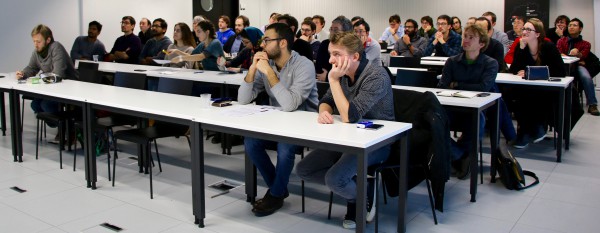MARVEL Junior Seminar — February 2017
The MARVEL Junior Seminars aim to intensify interactions between the MARVEL Junior scientists belonging to different research groups located at EPFL. The EPFL community interested in MARVEL research topics is very welcome to attend. We believe that these events will be central for establishing a vibrant community.
Each seminar consists of two presentations of 25 minutes each, allowing to present on a scientific question in depth, each presentation being followed by 10 minutes for discussion. The discussion is facilitated and timed by the chairperson of the day whose mission is to ensure active lively interactions between the audience and the speakers. Unfortunately the second presentation has to postponed to a later seminar.
Pizza is served as of 11:45 in the MED hall (floor 0), and after the seminar at 13:30 you are cordially invited for coffee and dessert to continue discussion with the speakers.

MARVEL Junior Seminar Organizing Committee — Ariadni Boziki, Francesco Ambrosio, Fernando Gargiulo, Sandip De, Davide Tiana, Michele Pizzochero, Quang Van Nguyen and Nathalie Jongen
Check the list of the next MARVEL Junior Seminars in 2017 here.
Abstract — Molecular dynamics (MD) simulations of nucleation and crystal growth of lead halide perovskites - Paramvir Ahlawat
The past 5 years have witnessed the rapid emergence of a class of solar cell based on mixed organic-inorganic halide perovskites. Lead halide perovskite solar cells (PSCs) are presently very hot topic for research due to their outstanding solar to electric conversion power efficiency, from 3% to 22.1% within a few years. However the lack of precise control over the nucleation and crystallization process creates a risk of forming unwanted defects such as pinholes, crystal defects and grain boundaries, and a limiting factor fo the efficiency of PSCs. In this talk, we present a standard and enhanced sampling molecular dynamics (MD) simulations of the nucleation and surface growth of lead halide perovskites. Moreover nucleation is a typical example of a rare event occurring on a timescale that is much longer than what atomistic simulations can typically afford. To overcome the timescale problem in MD simulations of nucleation, we employ the enhanced sampling methods developed in the Parrinello group. In particular, we compute free-energy profiles associated with the events of nucleation, adsorption and desorption of ions on difference surfaces. Such simulations will allow a deep insight into the complex nucleation process and crystal growth phenomena, thus paving the way towards rational control on design of crystals grown from solutions.
Abstract — Automating materials discovery using AiiDA: provenance concepts and some use cases - Giovanni Pizzi
"Materials by design", the main objective of Marvel, requires to run large numbers of simulations and to build databases of computed properties. A key challenge is the need to automatically prepare, execute and monitor workflows of calculations, and then store the results in a format easy to browse and query. AiiDA [1], actively developed within MARVEL, has been created precisely to help researchers in these tasks.
In this talk, after a short introduction on the basic concepts in AiiDA (directed graphs for the representation of the provenance, queries, workflows, ...), I will describe som use cases from my own research and from the research of some colleagues.
The aim is to show how the adoption of AiiDA can help researchers in automating calculations, managing their data (required nowadays by many funding sources: e.g. the EU requires a Data Management Plan for each project), searching for results and for past simulations, and disseminating the results (e.g. through the MaterialsCloud portal, that will be the main dissemination portal of Marvel and that I will briefly introduce).
[1] G. Pizzi et al., Comp. Mat. Sci. 111, 218-230 (2016)
Low-volume newsletters, targeted to the scientific and industrial communities.
Subscribe to our newsletter